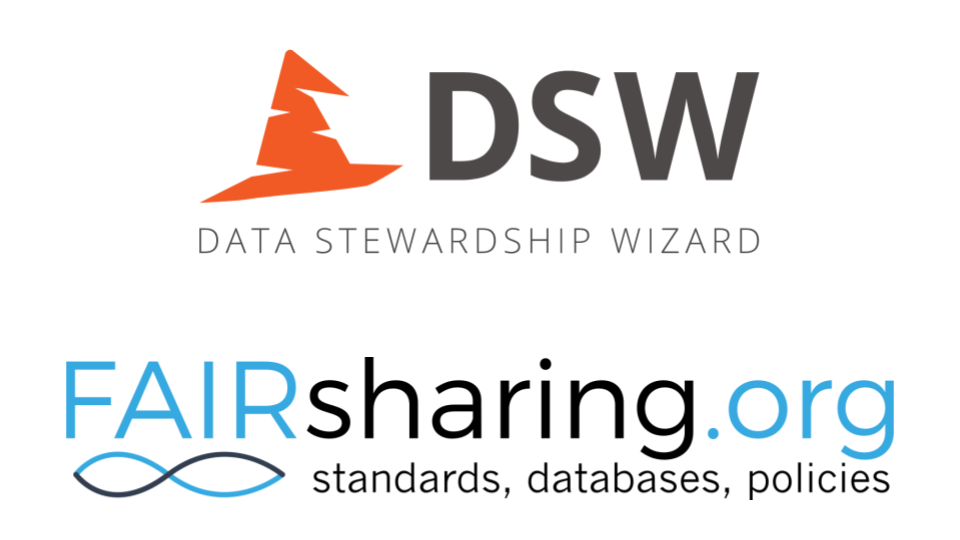This news item was collaboratively authored by Marek Suchanek and Allyson Lister.
Building on a strong history of collaboration and the needs of international user communities, the Data Stewardship Wizard (DSW) and FAIRsharing are in the process of increasing the connectivity of these widely used resources.
DSW helps researchers and data stewards create data management plans (DMPs) easily and efficiently; it is also working to make the DMPs machine-actionable to accelerate their review and use. FAIRsharing is a curated, informative and educational resource on data and metadata standards, inter-related to databases and data policies, across all disciplines. FAIRsharing serves users and producers of these resources, but also powers third party tools by providing trustworthy content to enable data management tasks. The latter is the focus of this new phase of the collaboration, which is set to deliver the powerful interrelated content of FAIRsharing to the DSW users, and help them create DMPs easier and with more confidence. This is a functionality that no other DMP platform has to date.
DMPs play the crucial role of outlining researchers’ intentions in following best practices to ensure datasets, code and other digital objects are Findable, Accessible, Interoperable and Reusable (FAIR). With numerous European, international, and national funders following suit, DMPs are now widely promoted as a valuable tool for implementing effective data management. To build effective DMPs, authors of those DMPs must be able to unambiguously and explicitly identify and name the community standards (e.g., terminologies, models, formats, minimal information requirements), and databases (repositories, knowledgebases) appropriate for describing and sharing their type of digital object (e.g., datasets, software, survey) within their discipline(s), as well as know the requirements of their funder’s policy. Knowing what to choose, given the wealth of standards and databases, it is often not so easy for researchers and those supporting them.
The current integration between the DSW and FAIRsharing provides as-you-type hints for standards and databases, a functionality that many tools powered by FAIRsharing have. However with this new collaboration we go a step further, and make FAIRsharing the single ‘trusted point of truth’ for DSW users with regards to standards, databases and policies, providing them with an unprecedented ‘select with confidence’ ability. This is enabled by the rich and curated description of standards, databases and policies in FAIRsharing, with tags by disciplines, and interlinks according to their relations. For example, in a given discipline there are specific representation models for datasets that require one or more terminologies to describe the parts; these models and terminologies are essential for the submission of the dataset to one or more databases. Therefore knowing what set of standards to use and for which database is essential, and the relationships in FAIRsharing will provide the necessary interlinked content that will help the DSW users, in a way that is not done by any DMP platform to date.
Key features of this new collaborative phase include:
- Identifiability: FAIRsharing DOIs are already used to unambiguously describe standards, databases within DSW and its stable of tools; this will be extended to policies.
- Connectivity: DSW will incorporate the FAIRsharing network graph, making relationships among standards, databases and policies accessible to DSW users. The DSW will allow specific policies to be declared as applicable in DMP questionnaires and then leverage them to provide policy-based guidance. In such cases, the standards and databases recommended by these policies will be highlighted to DMP authors as particularly relevant by those policymakers.
- Machine actionability: This collaboration will further enhance the creation of machine-actionable DMPs (maDMPs) through the use of FAIRsharing DOIs within DMPs and the ability to pull appropriate resource metadata from FAIRsharing records following the principles of Linked Open Data.
This work is funded in part by OSTrails and the ELIXIR-UK DaSH Fellowship.
